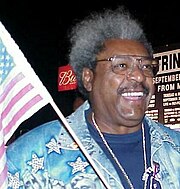Who was the greatest promoter of all time going back in boxing history. Who was the fairest? Who did the best for their boxers and paid them what they deserved. Who conned and tricked people the most? Who put on the greatest shows we've seen?
Who was most/least trustworthy of the history of promoters?
Eddie Hearn
dataurl902710.jpg
Don King
Frank Warren
Bob Arum
Oscar De La Hoya
Al Haymon
Floyd Mayweather Jr.
Kalle Sauerland
Akihiko Honda

Tex Rickard
1870–1929

Kellie Maloney
Richard Schaefer
Ricky Hatton
Wilfried Sauerland

Mickey Duff
1929–2014
Andrey Ryabinskiy
Mike Tetteh
Dean Lonergan
Murad Muhammad
Arthur Frederick Bettinson
1862–1926
Spencer Fearon
Lou DiBella
Dmitry Salita
Roy Jones Jr.
Sampson Lewkowicz
Yvon Michel

Lou Duva
1922–2017
Aileen Eaton
1909–1987
50 Cent
Humbert Fugazy
1885–1964
Truman Gibson
1912–2005
Bob Goodman
1939–2023
Jess McMahon
1882–1954
Bill Cayton
1918–2003
Butch Lewis
1946–2011
Frank Palermo
1905–1996
Sylvester Stallone
Who was most/least trustworthy of the history of promoters?
Eddie Hearn
dataurl902710.jpg
Don King
Frank Warren
Bob Arum
Oscar De La Hoya
Al Haymon
Floyd Mayweather Jr.
Kalle Sauerland
Akihiko Honda
Tex Rickard
1870–1929
Kellie Maloney
Richard Schaefer
Ricky Hatton
Wilfried Sauerland
Mickey Duff
1929–2014
Andrey Ryabinskiy
Mike Tetteh
Dean Lonergan
Murad Muhammad
Arthur Frederick Bettinson
1862–1926
Spencer Fearon
Lou DiBella
Dmitry Salita
Roy Jones Jr.
Sampson Lewkowicz
Yvon Michel
Lou Duva
1922–2017
Aileen Eaton
1909–1987
50 Cent
Humbert Fugazy
1885–1964
Truman Gibson
1912–2005
Bob Goodman
1939–2023
Jess McMahon
1882–1954
Bill Cayton
1918–2003
Butch Lewis
1946–2011
Frank Palermo
1905–1996
Sylvester Stallone








Comment